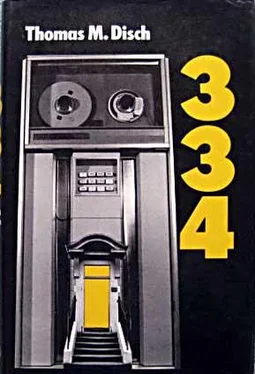“Oh, go on,” she said. “I’m enjoying it.”
“So am I, Mrs. Hanson, but it’s four o’clock.”
She felt obliged to say something intelligent before he went off, but at the same time she didn’t want to show that she’d guessed the purpose of the experiment. “It’s a very unusual plot.”
Len bared small, stained teeth in a smile of agreement.
“I always say there’s nothing that can beat a good love story.”
And before she could add her little joke (“Except perhaps a bit of smut”), Len had chimed in with: “I’ll agree with that, Mrs. Hanson. Friday, then, at two o’clock?” In any case it was Shrimp’s joke.
Mrs. Hanson felt she hadn’t shown herself at all to advantage, but it was too late. Len was gathering himself together, his umbrella, his black book, talking steadily all the while. He even remembered the wet plaid cap she’d hung up on the hook to dry. Then he was gone.
Her heart swelled up inside her chest, hammering as though it had slipped gears, ker-whop! ker-wham! She went back to the sofa. The cushions at the end where Len had sat were still pressed down. Suddenly she could see the room as he must have seen it: linoleum so filthy you couldn’t see the patterns, windows caked, blinds broken, heaps of toys and piles of clothing and tangles of both everywhere. Then, as if to complete the devastation, Lottie came staggering out of her bedroom wrapped in a dirty sheet and reeking.
“Is there any milk?”
“Is there any milk!”
“Oh Mom. What’s wrong now?”
“Do you have to ask? Look at this place. It looks as if a bomb hit it.”
Lottie smiled a faint, mussed smile. “I was asleep. Did a bomb hit it?”
Poor silly Lotto, who could ever stay angry with her? Mrs. Hanson laughed indulgently, then started to explain about Len and the experiment, but Lottie was off in her own little world again. What a life, Mrs. Hanson thought, and she went out to the kitchen to mix up a glass of milk.
9. The Air Conditioner (2024)
Lottie could hear things. If she were sitting near the closet that used to be the foyer she could understand whole conversations taking place out in the corridor. In her own bedroom anything else happening in the apartment was audible to her—the turbulence of voices on the teevee, or Mickey lecturing his doll in what he imagined was Spanish, or her mother’s putterings and sputterings. Such noises had the advantage of being on a human scale. It was the noises that lay behind these that she dreaded, and they were always there, waiting for those first masking sounds to drop, ready for her.
One night in her fifth month with Amparo she’d gone out walking very late, through Washington Square and past the palisades of N.Y.U. and the junior deluxe co-ops on West Broadway. She stopped beside the window of her favorite shop where the crystals of a darkened chandelier caught glints from the headlights of passing cars. It was four-thirty, the stillest hour of the morning. A diesel roared past and turned west on Prince. A dead silence followed in its wake. It was then she heard that other sound, a sourceless far-off rumble, like the first faint premonition, as one glides down a quiet stream, of the cataract ahead. Since then the sound of those falls had always been with her, sometimes distinctly, sometimes only, like stars behind smog, as a dim presence, an article of faith.
Resistance of a kind was possible. The teevee was a good barrier, when she could concentrate and when the programs weren’t themselves upsetting. Or talk, if she could think of something to say and find someone to listen to her. But she’d been submerged by too many of her mother’s monologues not to be sensitive to signals of boredom, and Lottie could not, like her mother, keep going regardless. Books demanded too much and were no help. Once she’d enjoyed the stories, simple as tic-tac-toe, in the romance comics that Amparo brought home, but now Amparo had outgrown comic books and Lottie was embarrassed to be buying them for herself. In any case they cost too much for her to get addicted.
Mostly she had to get by with pills and mostly she could.
Then, in the August of the year Amparo was to start at the Lowen School, Mrs. Hanson traded off the second teevee, which hadn’t worked for years, for a King Kool air conditioner of Ab Holt’s that also hadn’t worked for years except as a fan. Lottie had always complained about how stuffy her bedroom was.
Sandwiched between the kitchen and the main bedroom, its only means of ventilation was an ineffective transom over the door to the living room.
Shrimp, who was back home again, got her photographer friend from downstairs to take out the transom and install the air conditioner.
The fan made a gentle purring sound all through the night with every so often a tiny hiccoughing counterbeat, like an amplified heart murmur. Lottie could lie in bed for hours, long after the children were asleep in the bunks, just listening to the lovely syncopated hum. It was as calming as the sound of waves, and like the sound of waves it sometimes seemed to be murmuring words, or fragments of words, but however closely she strained to hear exactly what those words were, nothing ever clearly emerged. “Eleven, eleven, eleven,” it would whisper to her, “thirty-six, three, eleven.”
She assumed it was Amparo who was messing about in her makeup, had even gone so far as to mention the matter once at dinner, just her usual word to the wise. Amparo had sworn she hadn’t so much as opened a drawer, but thereafter there were no more lipstick smudges on the mirror, no spilled powder, no problem. Then one Thursday coming back wasted and worn out from one of Brother Cary’s periodic nonappearances, she found Mickey sitting at the dresser carefully laying on a foundation. His giggly dismay at her return was so ludicrous in the present blanked-out condition of his face that she simply burst out laughing. Mickey, without ever losing his look of comic horror, began laughing too.
“So—it was you all along, was it?”
He nodded and reached for the cold cream, but Lottie, misinterpreting, caught hold of his hand and gave it a squeeze. She tried to remember when she’d first noticed things out of place, but it was one of those trivial details, like when a particular song was popular, that wasn’t arranged chronologically in her memory. Mickey was ten, almost eleven. He must have been doing this for months without her being aware.
“You said,” in a self-justifying whine, “that you used to do the same thing with Uncle Boz. You’d dress up in each other’s clothes and pretend. You said.”
“When did I say that?”
“Not to me. You said it to him and I heard you.”
She tried to think of the right thing to do.
“I’ve seen men wear makeup. Lots of times.”
“Mickey, have I said anything against it?”
“No, but— ”
“Sit down.” She was brisk and businesslike, though looking at his face in the mirror she felt close to breaking up all over again. No doubt the people who worked in beauty shops had that problem all the time. She turned him round, with his back to the mirror, and wiped at his cheeks with a hankie.
“Now to start with, a person with your fair skin doesn’t need a foundation at all, or next to none. It isn’t the same, you know, as frosting a cake.”
She continued a stream of knowledgeable patter as she made him up: how to shape the lips so there always seems to be a little smile lurking in the corners, how to blend in the shadows, the necessity, when drawing on the brows, of studying their effect in profile and three-quarter views. All the while, in contradiction to her own sensible advice, she was creating a doll mask of the broadest exaggerations. When she put on the last brush stroke she framed the result with pendant earrings and a stretch wig. The result was uncanny. Mickey demanded to be allowed to look in the mirror. How could she say no?
Читать дальше












